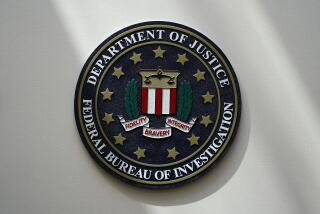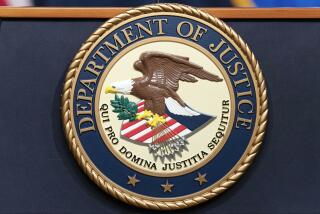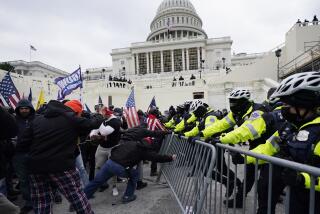Al Qaeda Suspect May Have Created Surveillance Files
WASHINGTON — A key Al Qaeda suspect arrested in Britain is suspected of having written some of the surveillance reports that prompted govern- ment officials to raise the terrorist alert in the United States, counter-terrorism officials disclosed Thursday.
The suspect, known by the names Abu Eisa al Hindi and Abu Musa al Hindi, is believed to have carried out the surveillance of U.S. financial institutions before the Sept. 11 attacks, then written detailed assessments of the targets that were circulated to other Al Qaeda members, the officials said.
Those target assessments were among the materials recovered in a raid in Pakistan last month that led to the capture of an Al Qaeda computer expert. The files included detailed information on the vulnerabilities of major U.S. financial institutions in New York, New Jersey and Washington. Among the targets were the Citigroup Center in New York and the International Monetary Fund and World Bank headquarters in the nation’s capital.
It was the detailed data on these files, “when married up with multiple streams of intelligence” suggesting that Al Qaeda was eager to strike in the United States before the November election, that prompted the U.S. government to raise the terrorism alert Sunday, a senior Bush administration official said.
Counter-terrorism officials declined to say how they had determined that Al Hindi may have created the surveillance reports, but indicated that the information might have come from one or more Al Qaeda detainees. Several key operatives have been captured recently in Pakistan and Britain.
The officials would not say whether the information came from Mohammed Naeem Noor Khan, the suspected Al Qaeda computer expert arrested July 15 in Pakistan, who was said to be providing some information to interrogators.
The link between Al Hindi and the files found with Khan also indicate that information obtained in Pakistan played a role in the more recent raids in Britain, although British authorities have stressed that their investigation of a suspected Al Qaeda cell predated the Pakistan arrests.
The flurry of raids and arrests continued Thursday with the capture in Saudi Arabia of an Al Qaeda figure who was a leading propagandist for the terrorist network in that country, officials said.
The roll-up of cells and operatives across several continents in recent weeks has been a breakthrough, but officials continued to urge caution.
“These have been some encouraging developments in the last few days,” a U.S. official said, “but there’s still reason to be very concerned about Al Qaeda’s interest in hitting us here.”
Adding to the concern were unsubstantiated intelligence reports that members of Congress had been targets of Al Qaeda. And intelligence sources in Pakistan said that questioning of Khan had produced evidence that the network had gathered detailed personal information about top-level U.S. government officials.
The senior Bush administration official said authorities remained on edge because of the flood of intelligence pointing to an attack, possibly to coincide with the election.
“I can tell you right now, this last week and a half has been every bit as tense as Christmas, if not more so,” the official said, referring to when officials grounded planes coming from Europe, fearing an attack was imminent.
“You sit up and think, whoa, this is very, very serious. Meetings till the wee hours, nonstop and among the very highest principals. And secure conference calls.”
Al Hindi is known to have spent time in the United States before Sept. 11, and has long been associated with Al Qaeda and is wanted in this country.
The surveillance assessments he is alleged to have created included hundreds of diagrams, drawings and photographs. Some of the files were as long as 20 pages on a single target, according to a U.S. official who spoke on condition of anonymity.
Al Hindi is cited in the recent report by the Sept. 11 commission under the name Issa al Britani, counter-terrorism officials said late Thursday. The report said Britani was sent by accused Sept. 11 mastermind Khalid Shaikh Mohammed to the United States in early 2001 “to case potential economic and ‘Jewish’ targets in New York City.” Mohammed was captured last year.
The FBI acknowledged Thursday that it had warned senior U.S. lawmakers about unsubstantiated intelligence suggesting that they or Congress as a whole might be the target of Al Qaeda attacks early this month.
FBI officials would not comment on whether any of that intelligence came from the recently captured Al Qaeda suspects.
But computer engineer Khan has told his FBI interrogators that the terrorist network has monitored top-level U.S. political officials so closely that it knows where they live and even knows the names of their neighbors, a Pakistani intelligence official said.
“He surprised the American interrogators by telling them the names and addresses of some American high officials, including the names of the people living in their neighborhood,” the official said. “The Americans could not check whether it’s true or if he was boasting. But they believe he knows a lot.”
Officials at the CIA, the Department of Homeland Security and the White House had no comment on any surveillance or planned attack on lawmakers. But they said they were closely monitoring -- and in some cases participating in -- the interrogations of Khan, several other suspected Al Qaeda operatives captured in Pakistan, 13 militants arrested in Britain and the suspect detained Thursday in Saudi Arabia.
Much of the focus remained on Khan, who authorities believe may have been a key link between Al Qaeda cells in Pakistan, Britain and the United States. But Khan, 26, also has remained somewhat of a mystery, according to authorities here and in Pakistan.
He was arrested while uploading information to several Al Qaeda-affiliated websites at an Internet cafe in Karachi, the Pakistani intelligence official said. Khan also was in the process of sending an e-mail death threat to President Bush and claiming that it came from Al Qaeda, according to the official, who spoke on the condition of anonymity.
The intelligence official said in an interview that Khan had for the most part refused to cooperate with Pakistani and U.S. authorities. The recent British raids have ties to investigations in both Pakistan and the United States, a British counter-terrorism official said. But the official did not confirm news reports that the British suspects were planning an attack on London’s Heathrow Airport.
After the arrests in Pakistan, conversations among the British suspects that were monitored by investigators raised fears that extremists might react either by accelerating terrorist plots or getting scared and going underground, the law enforcement official said.
“The suspects were spooked by what happened in Pakistan,” the official said. “That was why we jumped in.”
Saudi Arabia’s security forces said Thursday that they had arrested a leading wanted militant, Faris al Zahrani. State-run television said he was on a list of 26 top wanted militants with suspected links to Al Qaeda. There was no immediate indication that the arrest was related to those in Pakistan or Britain.
It also remained unclear whether the threats to U.S. members of Congress were learned about as a result of those arrests, or how serious they were.
Rep. Henry A. Waxman (D-Los Angeles) confirmed that he was called by the FBI in Los Angeles last Friday and warned of an “uncorroborated and unconfirmed” threat that members of Congress would be targets of a terrorist attack. His office was told that the period of greatest vulnerability was between Aug. 2 and Aug. 10.
He said he asked the FBI official what the significance of that time frame was and was told it was the anniversary of Iraq’s 1990 invasion of Kuwait.
Waxman said he was told that the FBI was passing along threat information to people in business and finance as well. Waxman got a second call from the FBI Saturday. But he said he did not regard the threat as serious because Congress was in recess and because no other lawmakers he checked with had been notified.
Senior U.S. intelligence officials discussed the latest threat information in a briefing on Capitol Hill on Thursday with congressional staff members who hold security clearances. A government official who participated in the briefing said there was no mention of a specific threat to lawmakers.
John Gannon, staff director of the House Select Committee on Homeland Security, said the FBI had recently received information indicating that members of Congress might be the targets of attacks but that the information was not considered reliable.
One congressional aide said the FBI’s warning, while taken in stride by some in Congress, had clearly shaken other staffers and lawmakers.
“Some of them were pretty rattled,” the staffer said.
Though a handful of federal lawmakers received anthrax-laced letters in late 2001, the FBI warnings appeared to be the first to generally tell members of Congress that they could be targets of terrorism, one official said.
Times staff writers Miller and Meyer reported from Washington and special correspondent Zaidi from Islamabad. Staff writers Janet Hook in Washington and Sebastian Rotella in Paris contributed to this report.
More to Read
Sign up for Essential California
The most important California stories and recommendations in your inbox every morning.
You may occasionally receive promotional content from the Los Angeles Times.










